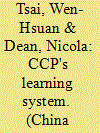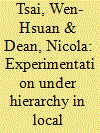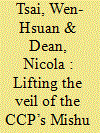| Srl | Item |
| 1 |
ID:
119712


|
|
|
| 2 |
ID:
132947


|
|
|
|
|
| Publication |
2014.
|
| Summary/Abstract |
Reforms carried out by the Chinese Communist Party (CCP) have long followed a traditional model of "experimentation under hierarchy." This article will attempt to develop this model further by building a framework to illustrate the influence of both the political dynamics of hierarchical central-local relations and local economic circumstances in the introduction of large-scale political reforms. The initiation and expansion of "experimental points" are only permitted in those select few provinces with both favourable political and economic local conditions, allowing the CCP to minimize risk and make informed decisions regarding possibilities for nationwide reform. This article proposes that the hierarchical interaction of central and local political elites, and in particular provincial secretaries, can explain the extent of reforms, whereas the type of reform is linked to distinct provincial economic conditions and the provincial secretary's interpretation of provincial priorities. Put succinctly, the CCP's model of political reform can be specifically characterized as "experimentation under hierarchy in local conditions." This article presents a detailed discussion of both the political and economic considerations inherent in this concept, and provides examples of reform programmes in Guangdong and Sichuan to illustrate the model in practice.
|
|
|
|
|
|
|
|
|
|
|
|
|
|
|
|
| 3 |
ID:
144378


|
|
|
|
|
| Summary/Abstract |
This article analyzes the Chinese Communist Party’s opaque mishu (secretary) system. It consists of two branches: institutional mishu and personal mishu. The former are mainly employed in Party Committee general offices, to assist the Committee leadership and liaise between departments to push Committee policies and to administer and compile relevant documents to support the policy-making process. Personal mishu work instead in the individual leaders’ executive offices. Those working for members of the Politburo Standing Committee can be divided into four main categories: political, confidential, security and life mishu. Both institutional and personal mishu work essentially on behalf of CCP leaders at various levels. In addition to clarifying the formal arrangements of the mishu system, this article will also consider the system through the lens of unrestricted informal politics, discussing particularly how mishu are able to accumulate power through leverage of the client–patron relationship between themselves and their leading cadre.
|
|
|
|
|
|
|
|
|
|
|
|
|
|
|
|